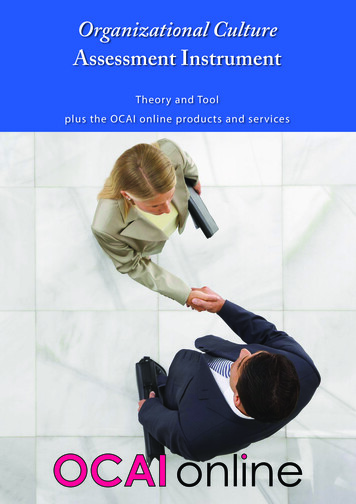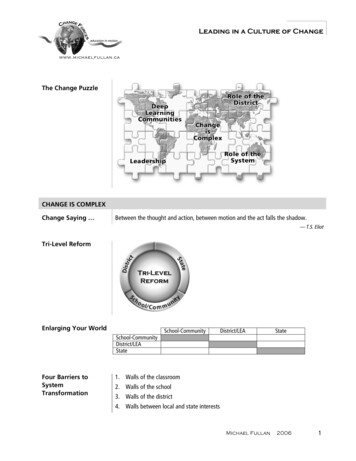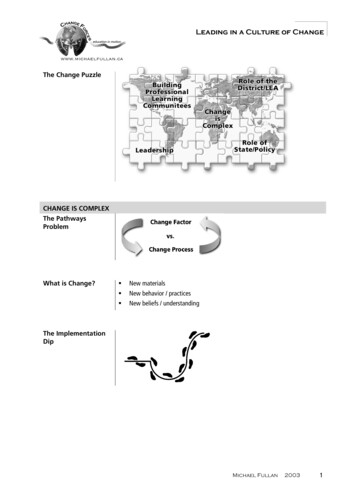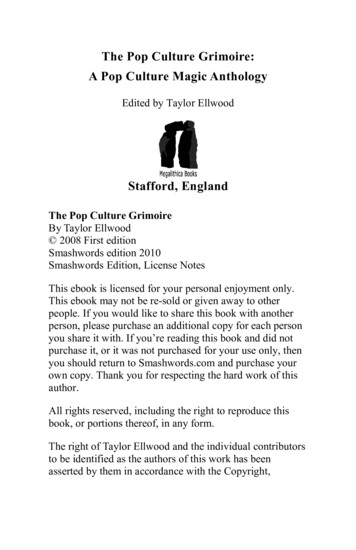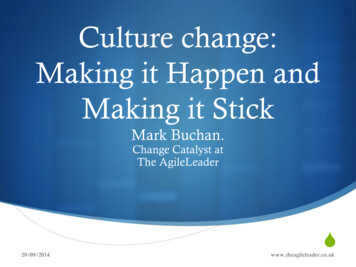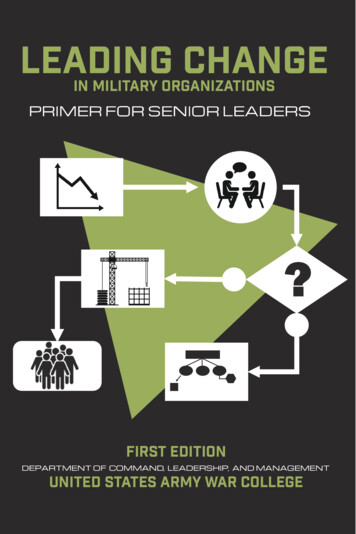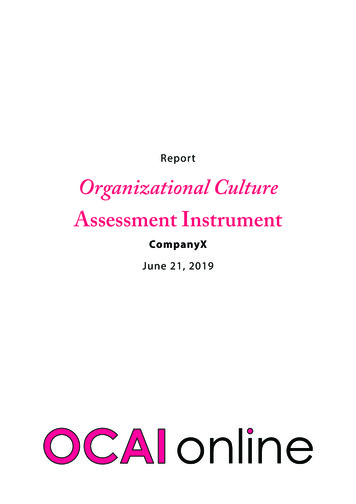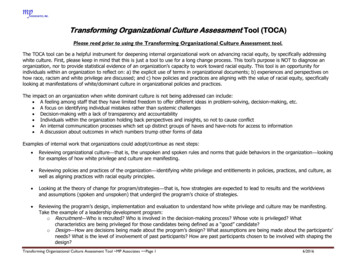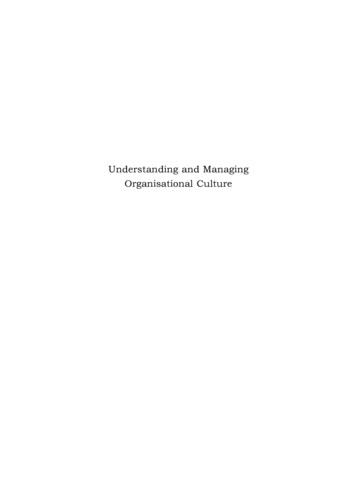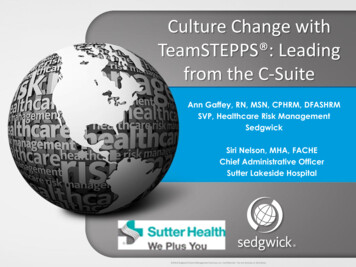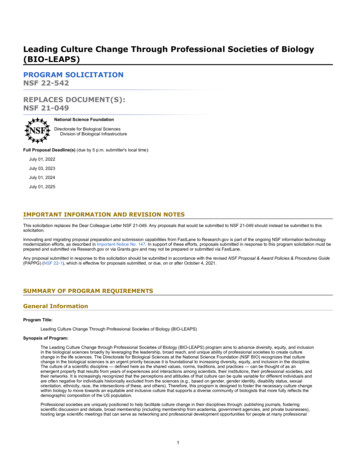
Transcription
Leading Culture Change Through Professional Societies of Biology(BIO-LEAPS)PROGRAM SOLICITATIONNSF 22-542REPLACES DOCUMENT(S):NSF 21-049National Science FoundationDirectorate for Biological SciencesDivision of Biological InfrastructureFull Proposal Deadline(s) (due by 5 p.m. submitter's local time):July 01, 2022July 03, 2023July 01, 2024July 01, 2025IMPORTANT INFORMATION AND REVISION NOTESThis solicitation replaces the Dear Colleague Letter NSF 21-049. Any proposals that would be submitted to NSF 21-049 should instead be submitted to thissolicitation.Innovating and migrating proposal preparation and submission capabilities from FastLane to Research.gov is part of the ongoing NSF information technologymodernization efforts, as described in Important Notice No. 147. In support of these efforts, proposals submitted in response to this program solicitation must beprepared and submitted via Research.gov or via Grants.gov and may not be prepared or submitted via FastLane.Any proposal submitted in response to this solicitation should be submitted in accordance with the revised NSF Proposal & Award Policies & Procedures Guide(PAPPG) (NSF 22-1), which is effective for proposals submitted, or due, on or after October 4, 2021.SUMMARY OF PROGRAM REQUIREMENTSGeneral InformationProgram Title:Leading Culture Change Through Professional Societies of Biology (BIO-LEAPS)Synopsis of Program:The Leading Culture Change through Professional Societies of Biology (BIO-LEAPS) program aims to advance diversity, equity, and inclusionin the biological sciences broadly by leveraging the leadership, broad reach, and unique ability of professional societies to create culturechange in the life sciences. The Directorate for Biological Sciences at the National Science Foundation (NSF BIO) recognizes that culturechange in the biological sciences is an urgent priority because it is foundational to increasing diversity, equity, and inclusion in the discipline.The culture of a scientific discipline — defined here as the shared values, norms, traditions, and practices — can be thought of as anemergent property that results from years of experiences and interactions among scientists, their institutions, their professional societies, andtheir networks. It is increasingly recognized that the perceptions and attitudes of that culture can be quite variable for different individuals andare often negative for individuals historically excluded from the sciences (e.g., based on gender, gender identity, disability status, sexualorientation, ethnicity, race, the intersections of these, and others). Therefore, this program is designed to foster the necessary culture changewithin biology to move towards an equitable and inclusive culture that supports a diverse community of biologists that more fully reflects thedemographic composition of the US population.Professional societies are uniquely positioned to help facilitate culture change in their disciplines through: publishing journals, fosteringscientific discussion and debate, broad membership (including membership from academia, government agencies, and private businesses),hosting large scientific meetings that can serve as networking and professional development opportunities for people at many professional1
levels, and electing leaders that greatly influence views and norms within a discipline. Recognizing that culture change in biology will requirebroad, sustained, and innovative approaches for meaningful and lasting changes to occur, society leaders will need to enable and support theestablishment and definition of new norms and practices in biology and to encourage engagement with experts in diversity, equity, andinclusion-related organizational change.NSF BIO will support awards that leverage the work of professional societies towards facilitating necessary culture change in the biologicalsciences to advance diversity, equity, and inclusion at scale — In other words, at the broad and deep scales that are required to address thissystemic issue. Examples of evidence-based work that will be supported through this program include (but are not limited to): (1) creatingtransparent norms and practices that engender and support a sense of belonging and identity for diverse scientists from all backgrounds anddemographics; (2) mitigating the systemic factors that result in inequities in the biological sciences, such as the perception of who a "scientist"is, and any factors that discourage diverse participation in biology; (3) assessing the state of norms and practices in professional societiesand/or the other components and institutions within their disciplines; and, (4) planning, implementing, and assessing society-sponsoredactivities to change culture — such as safe conference best practices, strategies to mitigate implicit bias in hiring/promotion for societyleadership positions, diversification of editorial boards, etc.Cognizant Program Officer(s):Please note that the following information is current at the time of publishing. See program website for any updates to the points of contact.BIO-LEAPS Working Group, telephone: (703) 292-8470, email: BIO-LEAPS@nsf.govApplicable Catalog of Federal Domestic Assistance (CFDA) Number(s):47.074 --- Biological SciencesAward InformationAnticipated Type of Award: Standard Grant or Continuing GrantEstimated Number of Awards: 11 to 14Awards are contingent on availability of funds and the quality of proposals.In each year, NSF expects to make approximately:Three to four Evaluation awards; up to 500,000 for up to two yearsThree to four Design awards; up to 500,000 for up to two yearsFive to six Implementation awards; up to 2,000,000 for four to five yearsAnticipated Funding Amount: 12,000,000Eligibility InformationWho May Submit Proposals:Proposals may only be submitted by the following:Institutions of Higher Education (IHEs) - Two- and four-year IHEs (including community colleges) accredited in, and having a campuslocated in the US, acting on behalf of their faculty members. Special Instructions for International Branch Campuses of US IHEs: Ifthe proposal includes funding to be provided to an international branch campus of a US institution of higher education (includingthrough use of subawards and consultant arrangements), the proposer must explain the benefit(s) to the project of performance atthe international branch campus, and justify why the project activities cannot be performed at the US campus.Non-profit, non-academic organizations: Independent museums, observatories, research labs, professional societies and similarorganizations in the U.S. associated with educational or research activities.Who May Serve as PI:The PI will be responsible for overseeing all aspects of the award. Additional members may be designated as co-Principal Investigators ifdeveloping and operating the BIO-LEAPS award would involve shared responsibility and well-justified close collaboration. Other members ofthe leadership team or collaborators are considered non-co-PI Senior Personnel.Limit on Number of Proposals per Organization:There are no restrictions or limits.Limit on Number of Proposals per PI or co-PI:There are no restrictions or limits.Proposal Preparation and Submission InstructionsA. Proposal Preparation InstructionsLetters of Intent: Not requiredPreliminary Proposal Submission: Not required2
Full Proposals:Full Proposals submitted via Research.gov: NSF Proposal and Award Policies and Procedures Guide (PAPPG) guidelines apply. Thecomplete text of the PAPPG is available electronically on the NSF website at: https://www.nsf.gov/publications/pub summ.jsp?ods key pappg.Full Proposals submitted via Grants.gov: NSF Grants.gov Application Guide: A Guide for the Preparation and Submission of NSF Applicationsvia Grants.gov guidelines apply (Note: The NSF Grants.gov Application Guide is available on the Grants.gov website and on the NSF websiteat: https://www.nsf.gov/publications/pub summ.jsp?ods key grantsgovguide).B. Budgetary InformationCost Sharing Requirements:Inclusion of voluntary committed cost sharing is prohibited.Indirect Cost (F&A) Limitations:Not ApplicableOther Budgetary Limitations:Not ApplicableC. Due DatesFull Proposal Deadline(s) (due by 5 p.m. submitter's local time):July 01, 2022July 03, 2023July 01, 2024July 01, 2025Proposal Review Information CriteriaMerit Review Criteria:National Science Board approved criteria. Additional merit review criteria apply. Please see the full text of this solicitation for further information.Award Administration InformationAward Conditions:Standard NSF award conditions apply.Reporting Requirements:Standard NSF reporting requirements apply.TABLE OF CONTENTSSummary of Program RequirementsIntroductionProgram DescriptionAward InformationEligibility InformationProposal Preparation and Submission InstructionsA. Proposal Preparation InstructionsB. Budgetary InformationC. Due DatesD. Research.gov/Grants.gov RequirementsVI. NSF Proposal Processing and Review ProceduresA. Merit Review Principles and CriteriaB. Review and Selection ProcessVII. Award Administration InformationA. Notification of the AwardB. Award ConditionsC. Reporting RequirementsVIII. Agency ContactsI.II.III.IV.V.3
IX. Other InformationI. INTRODUCTIONThe "culture" of science, technology, engineering, and mathematics (STEM) can be defined as the values, norms, priorities, and practices that govern researchand education environments, whereas "climate" refers to how people experience that culture. In STEM, culture is recognized as a critically important componentin the successful recruitment, retention, and advancement of diverse participants in the scientific enterprise. However, there is growing evidence that individualswho have been historically excluded from STEM frequently encounter a climate that is not welcoming to them. This unwelcoming climate can have a negativeimpact on STEM career trajectories and on the STEM enterprise itself. The causes of this current condition likely trace to historical cultural legacies that havedetermined many of today's values, norms, priorities, and practices, many of which can be exclusionary. Thus, we need to assess the components of STEMculture that result in these undesirable climates to identify strategies to create the needed change to ensure that persons of all identities and intersectionalitiesfeel welcome, respected, supported, and safe to thrive and succeed in their educational and career pathways.Professional scientific societies play a key role in shaping a discipline's culture by virtue of their significant responsibilities, broad reach, and substantialinfluence. Because professional societies include individuals from many institutions, and sometimes across sectors, they have the potential for sweepingimpacts. In addition, professional societies can be viewed as standard-setters; they model disciplinary norms and values, thereby exerting widespread influenceon the culture of a discipline or sub-discipline. By their very nature, societies can have an effect on many interrelated disciplinary components that may benefitfrom culture change, including mentoring, training, research environments, awards and recognition, hiring and promotion, departmental and institutionalpractices, publishing, and more. In all of these areas, scientific societies are poised to promote ethical standards, establish codes of behavioral conduct, supportbroadening participation activities and mentoring, set professional norms, diversify disciplinary leadership, and translate all of the above across a broad range ofinstitutions and people. Therefore, professional societies are well-positioned to make significant systemic change towards more diverse, equitable and inclusivedisciplines with more impactful outcomes than what can be achieved at the level of single projects or institutions.II. PROGRAM DESCRIPTIONThe BIO-LEAPS program of the NSF Directorate for Biological Sciences (NSF BIO) aims to advance diversity, equity, and inclusion (DEI) in the biologicalsciences by leveraging the leadership, broad reach, and unique ability of professional societies to enact culture change that results in welcoming climates fordiverse individuals. This program will consider involvement of professional societies or organizations that support research in any of the sub-disciplines inbiology that is supported by NSF's Directorate for Biological Sciences. The BIO-LEAPS program is particularly interested in culture change efforts with potentialfor broad impacts on an entire discipline or sub-discipline, such as might be achieved through partnerships across multiple societies; engagement with keystakeholders, including but not restricted to, grass-roots organizations, early-career groups, or industries; and consortium-building for collective action. Proposalsare expected to articulate how the investigators define culture, what specific components of culture they are trying to change, and how they will facilitate changeat a broad scale. BIO-LEAPS proposers are expected to partner with, or use the resources available through, professional societies to help change the culture ofbiology. NSF BIO-LEAPS is interested in supporting a wide range of professional society activities, especially those with strong potential to influence culturalfactors that impact individuals historically excluded from STEM. Examples include, but are not limited to: demographic self-assessments to determine baselinesfor change; development of community standards and how they are implemented for strongest impact; diversification of journal editorial and publishing practices;inclusive society conference practices; equitable composition of society leadership; networking and mentoring opportunities for historically excluded groups; DEIand inclusive leadership training; society partnerships for amplifying change; and early-career leadership opportunities.The BIO-LEAPS program recognizes that disciplines and professional societies may be at different points in the process of assessing and addressing theirculture. Therefore, this solicitation offers three tracks appropriate for various stages of project development. Proposers are not required or expected to pursuethese in a specific order, and there is no requirement that one track be completed prior to any other. Proposers should assess the three tracks described belowto determine which one best fits their current needs. Description of the three BIO-LEAPS tracks:1. The Evaluation Track is for projects focused on assessment and research of the values, norms, priorities, and practices associated with the culture ofthe discipline or sub-discipline (e.g., demographics and/or climate--including power-dynamics, procedural justice, norms, and behavioral expectations).Proposals submitted to this track can include evidence-based assessment and research activities (e.g., applied social science research focused onequity or cultural change in biology), as long as these activities are associated with measuring and assessing culture change through professionalsocieties, and they have the potential for broad impact. Examples of activities supported by this track include the creation of new tools for measuringclimate or other approaches for evaluation and assessment of culture, as well as dissemination. Assessment and evaluation tools must includeevidence of their effectiveness in measuring the intended factors. PIs may request up to 500,000 for up to 2 years of support for this track. Formativeassessments of activity in this track need to be reported in annual reports. Submissions to this track should begin with "EVALUATION:" in the title.2. The Design Track is for projects to develop an evidence-based plan to address broad-scale culture change within a discipline or sub-discipline.Proposals submitted to this track can include activities such as gathering the appropriate partners for a larger network of participants and/or developingresources to build the necessary infrastructure to submit a larger proposal. Proposals should explicitly describe why the funded activities are necessaryand how the funded activities will be used to create a future initiative, be it a grant proposal (e.g., a future BIO-LEAPS proposal or a proposal to anothersolicitation) or other activity. PIs may request up to 500,000 for up to 2 years of support for this track. Formative assessments of activity in this trackneed to be reported in annual reports. Submissions to this track should begin with "DESIGN:" in the title.3. The Implementation Track is for projects to implement evidence-based cultural change strategies that leverage the influence of biological professionalsocieties. These projects are expected to have a broad scope for cultural change across one or more (sub-)disciplines. Significant impacts will likelydiffer, depending on the systemic inequity issue(s) addressed, the culture-change goals identified, and the proposed intervention(s). Information on thenumbers and percentages of individuals or organizations reached and the degree of change that is expected from those who participate should bearticulated in the proposal to explain the scope of reach. For example, proposals by professional societies to alter the format/content/approach of alltheir regional and national conferences to include activities meant to change the practices, norms, and values of biology or its sub-disciplines as awhole could have significant reach if the societies have a large and broad enough membership and conference attendance. PIs may request up to 2,000,000 for 4-5 years of support for this track. Formative assessments of activities in this track need to be reported in annual reports. Submissionsto this track should begin with "IMPLEMENTATION:" in the title.Key Elements of a BIO-LEAPS Proposal4
All BIO-LEAPS proposals need to be evidence-based and grounded in relevant literature on organizational or systemic change and DEI. Proposals submitted toTracks 1 or 2 should include a clear description of the state of the sub-discipline or discipline and the evidence-based strategies to be used. Proposals submittedto Track 3 should clearly articulate what aspect(s) of the culture of the sub-discipline or discipline they will focus on, what the current state of that culture is, andwhat evidence-based strategies for change they will implement. They must also include individuals with expertise in one or more of the following areas:assessment, systemic or organizational change, or DEI. It is expected that individuals who are participating in the scope of work for a BIO-LEAPS proposal aregiven the appropriate resources and compensation to accomplish this work. Proposals are encouraged from, or that fully partner with, Minority ServingInstitutions, Primarily Undergraduate Institutions (PUIs), professional societies focused on DEI in STEM, and DEI community initiatives in STEM. BIO-LEAPSproposals are encouraged to leverage established networks, alliances, and programs such as NSF INCLUDES (Inclusion across the Nation of Communities ofLearners of Underrepresented Discoverers in Engineering and Science), NSF ADVANCE (Organizational Change for Gender Equity in STEM AcademicProfessions), or other existing broadening participation programs. Letters of collaboration with partners or other entities should be included as supplementarydocuments. Such letters should adhere to the format specified in the PAPPG. The proposal must include a section on broader impacts, which can include theproposed impacts related to culture-change. Each proposal must also include an explicit description of the project management team and their roles andresponsibilities, and an assessment plan that explicitly describes the formative and summative assessments of the project (for specific instructions, see SectionV. below).III. AWARD INFORMATIONAnticipated Type of Award: Continuing Grant or Standard GrantEstimated Number of Awards: 11 to 14Awards are contingent on availability of funds and the quality of proposals.In each year, NSF expects to make approximately:Three to four Evaluation awards; up to 500,000 for up to two yearsThree to four Design awards; up to 500,000 for up to two yearsFive to six Implementation awards; up to 2,000,000 for four to five yearsAnticipated Funding Amount 12,000,000Estimated program budget, number of awards and average award size/duration are subject to the availability of funds.IV. ELIGIBILITY INFORMATIONWho May Submit Proposals:Proposals may only be submitted by the following:Institutions of Higher Education (IHEs) - Two- and four-year IHEs (including community colleges) accredited in, and having a campuslocated in the US, acting on behalf of their faculty members. Special Instructions for International Branch Campuses of US IHEs: Ifthe proposal includes funding to be provided to an international branch campus of a US institution of higher education (includingthrough use of subawards and consultant arrangements), the proposer must explain the benefit(s) to the project of performance atthe international branch campus, and justify why the project activities cannot be performed at the US campus.Non-profit, non-academic organizations: Independent museums, observatories, research labs, professional societies and similarorganizations in the U.S. associated with educational or research activities.Who May Serve as PI:The PI will be responsible for overseeing all aspects of the award. Additional members may be designated as co-Principal Investigators ifdeveloping and operating the BIO-LEAPS award would involve shared responsibility and well-justified close collaboration. Other members ofthe leadership team or collaborators are considered non-co-PI Senior Personnel.Limit on Number of Proposals per Organization:There are no restrictions or limits.Limit on Number of Proposals per PI or co-PI:There are no restrictions or limits.V. PROPOSAL PREPARATION AND SUBMISSION INSTRUCTIONSA. Proposal Preparation Instructions5
Full Proposal Preparation Instructions: Proposers may opt to submit proposals in response to this Program Solicitation via Research.gov or Grants.gov.Full Proposals submitted via Research.gov: Proposals submitted in response to this program solicitation should be prepared and submitted inaccordance with the general guidelines contained in the NSF Proposal and Award Policies and Procedures Guide (PAPPG). The complete text of thePAPPG is available electronically on the NSF website at: https://www.nsf.gov/publications/pub summ.jsp?ods key pappg. Paper copies of the PAPPGmay be obtained from the NSF Publications Clearinghouse, telephone (703) 292-8134 or by e-mail from nsfpubs@nsf.gov. The Prepare New Proposalsetup will prompt you for the program solicitation number.Full proposals submitted via Grants.gov: Proposals submitted in response to this program solicitation via Grants.gov should be prepared and submittedin accordance with the NSF Grants.gov Application Guide: A Guide for the Preparation and Submission of NSF Applications via Grants.gov. Thecomplete text of the NSF Grants.gov Application Guide is available on the Grants.gov website and on the NSF website at:(https://www.nsf.gov/publications/pub summ.jsp?ods key grantsgovguide). To obtain copies of the Application Guide and Application Forms Package,click on the Apply tab on the Grants.gov site, then click on the Apply Step 1: Download a Grant Application Package and Application Instructions linkand enter the funding opportunity number, (the program solicitation number without the NSF prefix) and press the Download Package button. Papercopies of the Grants.gov Application Guide also may be obtained from the NSF Publications Clearinghouse, telephone (703) 292-8134 or by e-mailfrom nsfpubs@nsf.gov.In determining which method to utilize in the electronic preparation and submission of the proposal, please note the following:Collaborative Proposals. All collaborative proposals submitted as separate submissions from multiple organizations must be submitted via Research.gov.PAPPG Chapter II.D.3 provides additional information on collaborative proposals.See PAPPG Chapter II.C.2 for guidance on the required sections of a full research proposal submitted to NSF. Please note that the proposal preparationinstructions provided in this program solicitation may deviate from the PAPPG instructions.Cover Sheet: Research.gov Users: The Prepare New Proposal setup will prompt you for the program solicitation number (located on the first page of thisdocument). From 'where to apply', select Directorate for Biological Sciences, Division of Biological Infrastructure (DBI), Human Resources.Grants.gov users: The program solicitation will be pre-populated by Grants.gov on the NSF Grant Application Cover Page. Refer to Section VI.1.2. of the NSFGrants.gov Application Guide for specific instructions on how to designate the NSF Unit of Consideration. Beginning Investigators (individuals who have notbeen a Principal Investigator [PI] or co-Principal Investigator [co-PI] on a Federally funded award with the exception of doctoral dissertation, postdoctoralfellowship or research planning grants) listed as Lead PI must check the box for "Beginning Investigator" on the proposal Cover Sheet.Title of Proposed Project: Begin the title of the proposed project with one of the three following titles, based on the type of proposal you are submitting: 1)EVALUATION:, 2) DESIGN:, or 3) IMPLEMENTATION:Project Summary: The Project Summary should include sections described in the PAPPG (II.C.2.b).Project Description: The Project Description should follow the PAPPG (II.C.2.d) guidelines and must address Intellectual Merit and Broader Impacts (see alsospecific solicitation review criteria under section VI).The Project Description is limited to 15 pages and should include the following sections that are clearly labeled:1. Culture: Definition, Framing, and Change Goals: As part of the Intellectual Merit of the proposal, projects must: (a) clearly define 'culture' and describe howit is defined in their disciplinary context, (b) describe the framing of the culture problem/issue to be addressed, and (c) provide a clear statement of the changegoals. Definitions and framing are expected to have supporting evidence from the literature as well as data and assessments of the professional society(s) or thediscipline.2. Approach: The proposal must include a description of what the PI(s) plan to evaluate, assess, plan, and/or implement and why it is important as well asjustification for their approach. EVALUATION or DESIGN Track proposals must include a clear description of what evidence-based tools will be used to performevaluation and assessment (with relevant preliminary data/literature) or, if appropriate, what new tools will be created to perform this evaluation and assessment.IMPLEMENTATION Track proposals are required to include preliminary data/literature describing prior assessment and evaluation that supports the problembeing addressed, as well as the approach(es) that will be taken. It is expected that proposers cite relevant literature showing that these approaches have beensuccessful in the past, where appropriate, and address the potential for change using these approaches.3. Broader Impacts: Outcomes of the project relevant to Broader Impacts must be highlighted in this section. We encourage activities that aim to complementthe aspect(s) of culture identified and addressed in the first two sections identified above, although other broader impacts strongly connected to the project goalsare also acceptable.4. Evaluation and Assessment Plan: BIO-LEAPS proposals are required to include both formative and summative evaluation plans. The plans should bedeveloped by an evaluator with appropriate expertise. The formative evaluation should include benchmarks and indicators of progress, whereas the summativeevaluation should assess the overall impact of the project on culture change in the target scientific community. In particular, the proposal should identify specificcultural outcomes sought, along with performance measures and an evaluation timetable. Because culture change will take both time and broad participation,the assessment plan should describe how and when assessment outcomes will be shared with the project participants, the professional society leadership, andother stakeholders outside the participants in the proposal (e.g., through professional meetings or publications). Proposals should describe mechanisms forregular feedback from the evaluator(s) and how that feedback will inform the project planned activities and strategies. Awardees should be prepared tocontribute to the BIO-LEAPS program evaluation, including participation at NSF-sponsored PI meetings, and periodic cross-award, joint video conferences toshare insights, effective practices, and evaluation findings. The project team should ensure that the project benefits from an unbiased and external perspectivein project assessment/evaluation activities. Project evaluator(s) can be from an assessment unit or consulting entity. If a project chooses to involve an individualor a team from the lead or collaborating institution(s) in the evaluation, then the project must provide justification and explain how lack of bias is ensured. Thissection should also describe project evaluation sustainability plans, including the efforts that will be made so that the assessment/evaluation tools that aredeveloped/implemented during the project period are available to the professional society beyond the award period. The lead evaluator must be listed as one ofthe senior personnel.5. Project Management Plan: Proposals must include a project management plan and timeline. The Project Management Plan can be up to two pages withinthe 15 page limit. The Project Management Plan should (1) articulate how the leadership and coordinators will facilitate participant communication andin
The Leading Culture Change through Professional Societies of Biology (BIO-LEAPS) program aims to advance diversity, equity, and inclusion. in the biological sciences broadly by leveraging the leadership, broad reach, and u

